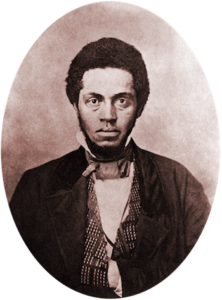
Osbourne Perry Anderson
*Osborne Perry Anderson was born on this date in 1830. He was a Black abolitionist.
Anderson and John Anthony Copeland Jr., who was from West Fallow Field, Pennsylvania, attended Oberlin College in Oberlin, Ohio. He later moved to Chatham, Canada, where he worked as a printer for Mary Ann Shadd's newspaper, The Provincial Freeman.
In 1858 Anderson met John Brown and eventually became persuaded to join his band of men determined to attack Harpers Ferry. He was one of the five Black men to accompany John Brown in the raid on the Federal Arsenal at Harpers Ferry, Virginia (now West Virginia), in October 1859. This was Brown’s radical scheme to free the United States of slavery.
Like Brown and the other followers, Anderson believed that if the group seized weapons at Harpers Ferry and then marched south, they would create a massive slave uprising that would liberate all of the nearly four million African Americans in bondage. He was the only Black to escape capture. In 1861, Anderson, now safely in the North, wrote A Voice From Harper’s Ferry with assistance from Mary Ann Shadd.
Here, he described his role in the raid and argued that many local slaves would have welcomed their liberation and that some had helped Brown and his men. Anderson's account was the only one published by a member of Brown's party, and it provided a rare first-hand description of these abolitionists' events and motivations. In 1864, five years after the Harpers Ferry Raid, Anderson enlisted in the Union Army, serving as a recruitment officer in Indiana and Arkansas.
Osborne Anderson died on December 13, 1872, in Washington, D.C., at forty-two.
Osborne Perry Anderson, A Voice from Harper's Ferry:
A Narrative of Events at Harper's Ferry with Incidents Prior and After its Capture by Captain John Brown and His Men (Boston: Privately Printed, 1861); Timothy Patrick McCarthy and John Stauffer,
Prophets of Protest: Reconsidering the History of American Abolitionism (New York: The New Press, 2006);
Herb Boyd, Autobiography of a People: Three Centuries of African American History Told by Those Who Lived It (New York: Doubleday, 2000);
Peggy A. Russo and Paul Finkelman, Terrible Swift Sword: The Legacy of John Brown (Athens: Ohio University Press, 2005)